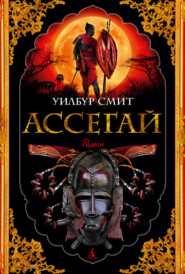По всем вопросам обращайтесь на: info@litportal.ru
(©) 2003-2024.
✖
Golden Lion
Автор
Год написания книги
2019
Настройки чтения
Размер шрифта
Высота строк
Поля
He shouted a few words in a tongue that Judith knew was African, but could not comprehend. A few seconds later there came the reply, a loud keening cry that she instantly recognized as the start of a chant. It was answered by a mass of deep, masculine voices grunting, ‘Huh!’, followed immediately by feet stamping the deck as one. The first voice continued with the chant and, as it did, the sailors fell back to either side so that the deck in front of Judith emptied and there before her came a sight that thrilled her heart almost as much as the feel of Hal’s arms around her.
Aboli stood on the bare planking. On his head he wore a tall headdress of white crane’s feathers that seemed to increase his already magnificent height so that he resembled a giant or a jungle god rather than a mortal man. In his hand he carried a broad-bladed stabbing spear and around his neck there was a kilt of leopard’s tails.
Behind him came the Amadoda, men of his tribe who had been recruited to serve on the Golden Bough and who had swiftly proven to be as powerful and deadly at sea as they had been in the forests and open savannah that was their native land. They, too, wore crane-feather headdresses, though none was as tall or as splendid as Aboli’s, for he was their chief.
Forward they came, their voices joining with his in rich, sonorous harmonies that proclaimed their valour, their comradeship and their willingness to die for their cause. All around, the rest of the crew looked on in slack-jawed amazement, for they had never seen the Amadoda like this, in all their glory. The men came forward until they were just a few paces from Judith and Hal and their song, their foot-stamps, their grunts and their perfectly co-ordinated movements combined in a way that was part dance, part military drill and part sheer celebration of the joy and pride of being a true warrior.
Their song finished and all around burst into applause, none more than Judith, for she, too, was a daughter of Africa and even though the words they sang were not known to her, she understood the spirit in which they were sung completely. Then Aboli stepped towards her. With courtly dignity he removed his headdress and placed it on the deck beside him. Then he got down on one knee, reached out and took Judith’s right hand in his, lowered his head and kissed her hand.
It was the tribute of a born aristocrat to his queen. Judith was all but overcome with the magnificence of his gesture and as he rose to his feet again, she kept hold of his hand and said, ‘Thank you, Aboli. Thank you with all my heart,’ for she knew that he had pledged himself to her and that she could count on him, absolutely, forever.
Hal was next to take Aboli’s hand. ‘Thank you, old friend. That was magnificent.’
Aboli smiled. ‘I am a prince of the Amadoda. What else could it be?’
And so the festivities began. As morning gave way to afternoon, and afternoon to evening, food was eaten, and drink consumed, then the crew’s musicians got out their fiddles, pipes and drums and the singing and dancing began. Judith let Hal lead her out to the floor and they improvised a combination of reel and jig that seemed to match the band’s seafaring tunes well enough. Some of the native cooks and serving girls also found themselves pressed into service on the dancefloor, though Hal had made it very clear indeed that no liberties were to be taken and that any man found to have forced himself on a woman could expect a taste of the lash. Finally, as the sun went down, Hal stood on the steps leading up to the poop deck, looked out over the revellers and called for silence.
‘Right, you drunken scoundrels,’ he shouted, sounding less than entirely sober himself, ‘I have a few words to say to you all.’
He was greeted by shouts of encouragement and a few good-humoured catcalls. ‘Now, my name – my proper, formal name – is Sir Henry Courtney.’
‘It’s all right, skipper, we know who you are!’ a wag called out.
‘Good, because there’s a reason I said that, which will soon become clear. But first, let me say this: tomorrow we set sail for England!’
A huge roar of approval arose from the Anglo-Saxon contingent of the crew. ‘Of course,’ Hal went on, ‘those members of the ship’s company whose homeland lies here in Africa will be free to return to their homes. But not before we have completed one last task.
‘As many of you know, my father, Sir Francis Courtney, along with the help of many of you here, captured many ships, sailing under Dutch and other flags—’
‘Damn cheese-heads!’ someone shouted, to great approval from his mates.
‘—and from these prizes he took a very large amount of gold, silver and other valuables. We are going to go and recover that treasure and all of you – every last one – will get his share, fair and square, according to his length of service and seniority. And I can promise …’ Hal had to raise his voice over the babble of cheers and excited chatter, ‘that not a man-jack of you will walk away with less than fifty pounds, at the very least!’
Hal grinned at the cheers his promise provoked, then raised his hand for silence again. ‘You all fully deserve your reward. No man could ask for better, braver, more loyal crewmates than you have been to me. You’ve proved your worth as sailors and fighters a hundred times over. You have pledged yourselves to me and now I make this pledge to you. I am going to lead you back home and give you all you need to lead a fine life when you get there. But first, gentlemen, I wish to propose a toast. Would you please raise your glasses to the woman that I will be taking back to my home, there to become my wife, my beloved Judith. Men, I give you: the future Lady Courtney!’
When the toast had been drunk, along with several more proposed from various members of the crew, Hal and Judith were finally free to retire together to his quarters. Being the creation of a wealthy aristocrat, the Golden Bough did not lack for creature comforts. There was not a battleship in the Royal Navy that housed its skipper more comfortably than the cabin provided for the Bough’s master. An elegantly carved desk provided the perfect place for the captain to keep his logbook up to date, while fine Persian carpets were enough to make guests feel that they were in the drawing room of a gentlemanly country house or London pied-à-terre, rather than the lower deck of an ocean-going sailing ship.
‘I have made one significant improvement to our sleeping arrangements since you last sailed on the Bough,’ said Hal as he paused outside the door to his cabin. ‘It kept the ship’s carpenter busy for a good week. Now, close your eyes …’
Judith did as she was told as Hal opened the cabin door then took her hand and led her into his personal domain. She took a few more blind steps until he said, ‘Stop!’ and a moment later, ‘You can open your eyes now.’
Before her hung a sleeping cot, but this was twice the width of a normal berth and hung from four hooks instead of the usual two. Diaphanous white gauze curtains were gathered round the ropes on each corner, and a coverlet of silk damask whose pale grey and silver pattern glimmered in the light from the stern windows lay over sheets and pillows of finest Egyptian cotton.
‘Hal, it’s so beautiful,’ Judith gasped.
‘I found the linen aboard a dhow we captured,’ Hal said with a grin. ‘The captain said it was bound for a sheikh’s harem. I told him I had a better use for it.’
‘Oh, really?’ said Judith, teasingly. ‘And what use in particular did you have in—’
She never had the chance to finish her question, for Hal simply picked her up and deposited her on the silken bedcover, thinking how wise he had been to make the carpenter test the hooks from which the cot was suspended to make sure they could handle any conceivable strain.
When the Buzzard had first sailed north to seek his fortune in the service of the Arab invasion of Ethiopia, caring not a jot for the religious or political issues at stake but choosing the side he believed most likely to pay him best, he barely spoke a word of Arabic. He considered it an ugly tongue, one beneath his dignity. He soon realized, however, that his ignorance was a great disadvantage since men around him could converse without him having the first idea what they were saying. So he began to study the language. His endeavours had continued during his convalescence so that it was now no difficulty for him to comprehend the Maharajah Sadiq Khan Jahan when the latter said, ‘I must congratulate you, your lordship, on your remarkable recovery. I confess, I had not believed you would ever rise from your bed. But now just look at you.’
In his pomp, the Buzzard had been a master of sly condescension and insincere compliments and he was not inclined to believe that the haughty figure before him meant a single one of his honeyed words. The contrast between the Indian prince in his silk and gold-threaded finery, dripping with more jewels than a king’s mistress, and the Buzzard, a decrepit, one-armed Caliban, with his skin like pork crackling and a face uglier than any gargoyle ever sculpted was simply too great to be bridged by words. But the Buzzard was a beggar and could not afford to be a chooser, so he gave a little nod of his head and wheezed, ‘You’re too kind, your royal highness.’
And, in all truth, his recovery, however partial it might be, was indeed the product of an extraordinary effort of will. The Buzzard had lain in bed and made an inventory of his body, concentrating on those parts of it that still functioned at least moderately well. His legs had not been broken, and though they were covered with burns and scar tissue, the muscles beneath the ravaged skin seemed to be capable of supporting and moving his body. Likewise, though his left arm was no more, his right arm was still whole and his hand could still grasp, so he might yet hold a sword again one day. He had the sight of one eye and hearing in one ear. He could no longer chew properly and his digestion seemed to have become unduly sensitive so that he could only eat food that had already been broken down into a soft, mushy porridge. But it was enough that he could still eat at all, and if his food was nothing more than a bland, tasteless porridge, it hardly mattered, since his tongue seemed unable to distinguish flavour any more, no matter how much salt, sugar or spice was added.
Above all, however, the Buzzard’s mind was still sound. He had suffered terrible headaches and the pain in every part of his body – including, strangely, those that no longer existed – was unrelenting. Still he was able to think, and plan, and calculate, and hate.
It was that hatred above all that drove him on. It had forced him to keep getting up when at first, unused to the imbalance of his body, he kept falling. It drove him through gruelling physical activities, in particular the building up of his surviving arm’s strength by the repeated lifting of a sack of millet, procured from Jahan’s kitchens, when with every single breath he took the air cut through his throat and lungs like caustic acid.
The black, burning fire in the Buzzard’s soul seemed to fascinate Jahan. ‘Please, don’t let me interrupt you. Pray continue with your exertions,’ he said, and stepped right up to his guest, making no effort to disguise the mix of revulsion and fascination he felt in the presence of such a foul and monstrous distortion of a man.
The Buzzard felt Jahan’s lordly eye upon him and the urge to defy him drove him on. He lifted the sack, which he held in his hand by the neck, again and again, though his exhausted muscles and scorched chest begged him to stop. He was feeling faint, lathered in a film of pus and bloodstained sweat and on the point of collapse when there was a knock on the door and one of Jahan’s functionaries entered. The man was unable to conceal the shock on his face when he set eyes on the Buzzard, who was bent almost double, his one good hand resting on his knee and his back heaving up and down. But he re-gathered his composure and spoke to Jahan. ‘There is a man at the gate who insists that you wish to see him, your sublime excellency. He says his name is Ahmed and he is a leather worker. It seems he has finished the task you set for him. When I asked him to explain himself he refused, claiming that you had sworn him to secrecy.’
Jahan smiled. ‘That is indeed true. Send him in.’ Then he bestowed a particularly condescending smile upon the Buzzard, and said, ‘I have brought you a small gift, your lordship. Just a miserable thing, but I believe it may be of interest.’
William Grey, His Majesty’s Consul to the Sultanate of Zanzibar, stood in the line of supplicants waiting to plead their case outside Maharajah Sadiq Khan Jahan’s palace, cursing the bad luck and even worse judgement that had brought him to this intolerable situation. Through all his years in Zanzibar, Grey had been welcomed as an honoured guest by Jahan, as he was by far the most powerful, wealthy and influential members of Zanzibar society. For Grey was not only the representative of one of Europe’s greatest monarchs, he was also a convert to Islam, a change of faith that had brought him much favour and granted him access to places and people beyond the reach of any Christian. Then that conniving Scots rogue Angus Cochran, titled the Earl of Cumbrae, but more aptly nicknamed the Buzzard, had arrived in Zanzibar, closely followed by an arrogant young pup called Henry Courtney, whereupon the life of ease and privilege that Grey had constructed over many years had fallen apart in the matter of a few short months.
It had all begun with the Buzzard pestering Grey to use his influence to obtain him a commission to fight for the Sultan of Oman against the Emperor of Ethiopia. The piratical Scot planned on growing rich in war booty taken from the Christians and was happy to pay the very reasonable fee Grey charged for his services. To give the Buzzard his due, he had kept his word. The moment the Letter of Marque was placed in his hands he set sail for the Horn of Africa and set to work on the task for which he had been commissioned.
Five weeks later, young Courtney arrived, apparently eager to join the struggle against Ethiopia and, like the Buzzard, he also purchased a Letter of Marque. Not surprisingly, Courtney was eager to hear all he could about the war and had been fascinated to discover that the Earl of Cumbrae was also playing his part. Grey had not given Courtney’s interest in the earl a second thought. Why should he? The Muslim cause was about to receive a second heavily armed warship, with which it would exert total control over all the waters between Arabia and the coast of Africa. As the man who had helped procure the ships, Grey would be held in greater esteem than ever.
In the event, however, Courtney had weighed anchor and chased after the Scotsman without so much as a by your leave, sneaking away like an ungrateful, deceitful, two-faced traitor and fighting for the Ethiopian emperor and his general Nazet. It transpired that his real intent all along had been the pursuit of vengeance against the Buzzard, whom he held responsible for his own father’s death. A short while later news had reached Zanzibar that Courtney had found the Scotsman and engaged him in battle. The story went that the Buzzard, fighting till the last, had been burnt alive and gone down with his ship, the Gull of Moray.
In the old days, Grey would have been able to confirm the veracity of this account and uncover a great deal more information to which the common herd were not privy. But this was no longer possible, for Courtney had taken to harassing, capturing and sinking Arab vessels up and down the Red Sea, to the consternation of the men who owned the stricken vessels and could no longer profit from their cargoes. These men now held Grey at least partially responsible for their losses and shunned him accordingly.
Every door in Zanzibar, or at least every door that mattered, had been slammed in his face and Grey now knew no more than the lowliest guttersnipe or coffee-shop gossip. All he could do was keep coming here, to the maharajah’s palace, in the hope that one day his serene, magnificent and merciful highness Sadiq Khan Jahan would show compassion for his plight and allow him to plead his case. Grey looked ahead of him in the queue and saw Osman, a procurer of women and small boys with whom he had once done regular business. But he’d not laid hands on one of Osman’s pretty little fancies, male or female, in months. Osman – a mere flesh-peddler! – had given him a regretful shrug and said he could no longer be seen to do business with a man of Grey’s reputation.
Grey seethed as he watched Osman gossiping with one of the guards at the gate. The press of people, the clamour of their pleading voices and the smell of their unwashed bodies combined to form an unbearable assault on his senses. Grey had long lived in the tropics and affected Arab dress as well as religion, for long flowing robes were more comfortable by far than the heavy coats of thick wool that most Englishmen insisted on wearing, as if entirely indifferent to their geographical and climatic circumstances. Nonetheless, he was perspiring like a pig on a spit and his temperature rose still higher when he saw a leather-peddler he knew, Ahmed by name, given the sign to enter the palace. Ahmed was carrying a large box, similar to the ones ladies used to convey their headgear. Grey paid it no mind.
A few minutes later, another of the palace functionaries appeared at the gate and had a word with one of the guards. At once three men were despatched into the crowd, beating men and women out of the way with long wooden staffs as they forced their way through the mob. With a start Grey realized that they were heading directly for him. He panicked and tried to get away but the sheer press of bodies was so heavy that he could not force his way through and suddenly he was not only sweating like a pig but squealing like one too as he was grabbed by the arms and half-dragged, half-carried up to the gates and then through them before being deposited unceremoniously on the ornately tiled floor.
Grey rose to his feet to find the same official who had summoned Ahmed standing close by. ‘If you will come this way, effendi, His Excellency, in his great wisdom and mercy, wishes to speak to you.’
As he followed the official along a cool, shaded cloister, through which he could see the waters of a fountain glittering in the noonday sun, Grey realized that the three guards who had been sent to fetch him were following close behind. They no longer carried their staffs, but each bore a wickedly curved scimitar tucked into his scarlet waistband.
It struck Consul Grey that the invitation to an audience with the maharajah might not turn out to be quite the blessing he’d been hoping for.
The Buzzard might not have many of his senses in full working order, but he was still perfectly capable of smelling a rat when one went by right under his nose. That heathen bastard Jahan was up to something, he was sure of it, but what? And how in heaven’s name did an insignificant little man who worked in leather fit into the maharajah’s plans?
Before the question could be answered there was a knocking on the door. Jahan called out, ‘Enter!’ and who should step into the room, looking like a huge jellied pudding, trembling with fear, but His Majesty’s Consul in Zanzibar himself. The Buzzard waited while his fellow Briton bowed and scraped to the maharajah and then rasped, ‘Good morning, Mr Grey. Hadn’t expected to clap an eye on you again.’
The Buzzard was becoming used to the successive expressions of shock, disgust and barely suppressed nausea (or even expressed nausea in some extreme cases) that his appearance provoked. But Grey’s discomfiture was even more absolute than most. His mouth opened and closed wordlessly as he searched in vain for something remotely appropriate to say before he finally gasped, ‘But … But … You’re supposed to be dead.’
The Buzzard stretched the remains of his lips into something approximating a smile. ‘Evidently I am not. Apparently the Almighty still has plans for me in this world, rather than the next.’
‘Truly, Allah is all-knowing and merciful,’ said Grey, darting a glance at Jahan to see whether his piety had been appreciated.














